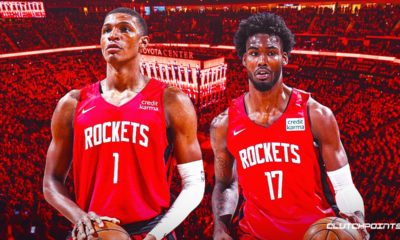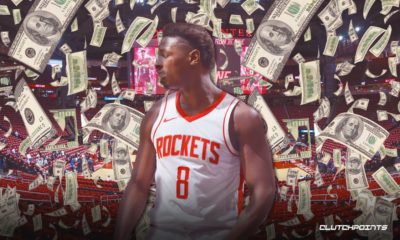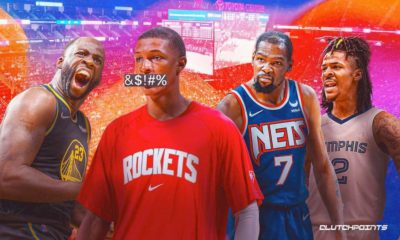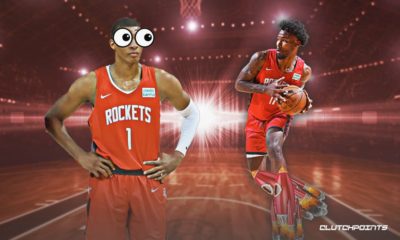Rockets
The greatest backcourt in NBA history seeks to shed its own past
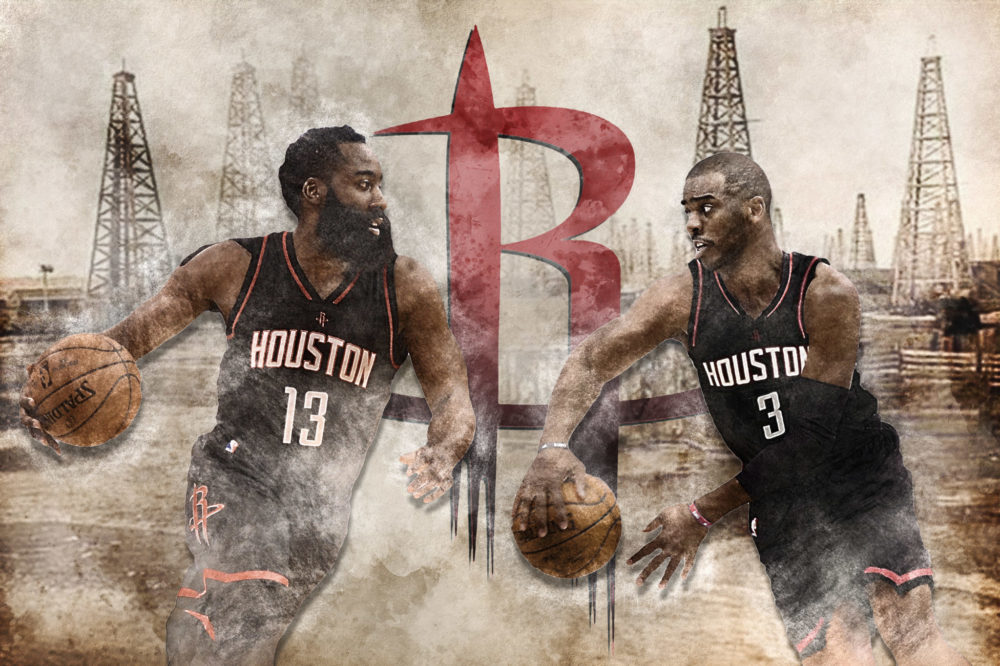

Four years ago, Chris Paul committed two turnovers in the final 17 seconds of Game 5 of the Western Conference Semifinals in a series the Oklahoma City Thunder won 4-2.
For all the brilliance Paul has produced in the playoffs, memorably dismantling the San Antonio Spurs in Game 7 during the 2015 postseason, the specter of that series and the Los Angeles Clippers’ playoff failures continue to haunt his legacy.
Last season, James Harden found himself on an island against the San Antonio Spurs’ aged Hall of Famer, Manu Ginobili. With seconds remaining in overtime, it was Ginobili who added to his legacy, blocking Harden’s final attempt and stealing his resolve. (Harden was a no-show in Game 6).
While exhilarating and enjoyable to viewers, the playoffs can bring painful memories to certain players. Each regular season is so long, you would think stars have the ability to block out the harrowing failures–from a single series, or even one quarter — they’ve endured in the past.
For role players, it’s likely much easier. But for the exclusive group consistently among the top 10 of their profession, it’s seemingly impossible. When they aren’t numb to the fact that their legacies will be evaluated ad nauseam in the summer following a playoff meltdown or simply a failure to advance, it continues to build up in their minds. Layer by layer.
Entering the 2018 postseason with a 65-17 record, the Houston Rockets feel similar to a support group. Players, including the two leaders of the show, have joined forces after hitting various roadblocks in their careers. The common goal is to shake every ghost that’s haunted them along the way, whether it’s playoff fiascos, past injuries, or just the lack of finding a successful niche in the league.
Oh, and the president of this support group is a head coach that revolutionized the sport as a whole, yet hasn’t lived up to playoff expectations.
Mike D’Antoni now has six seasons of reaching 50-plus wins as a head coach, giving him a 575-470 (.550) record in regular season play. His playoff success? A lowly 32-38 (.457) record during his time with Phoenix, New York, Los Angeles and Houston.
A new Houston Rockets era
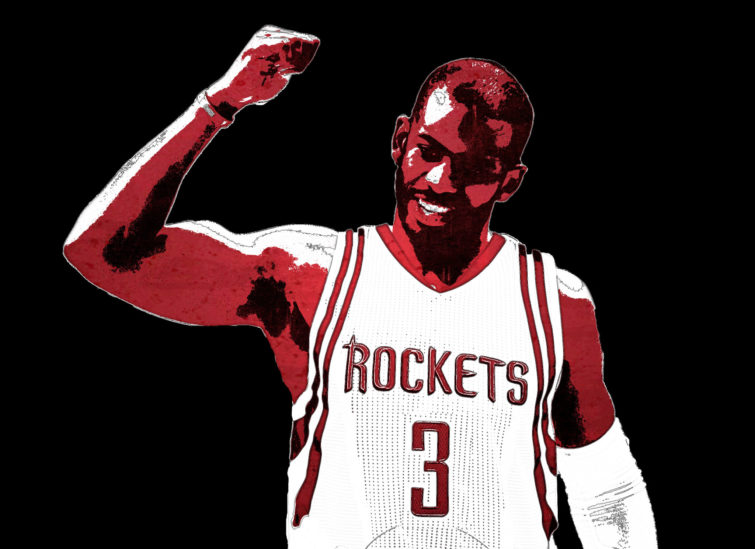
Original Photo: Jayne Kamin-Oncea-USA TODAY Sports
When Chris Paul decided to make the jump to Houston, it became clear he wasn’t going to let the curse of the Clippers dictate how his career is painted in the end. Injuries led to him watching the second round of last year’s playoffs from his couch, where he was able to pinpoint exactly what James Harden needed as a running mate.
Paul, who is arguably the smartest player the game has ever seen with the brain of a computer chip, knew how he could help the Rockets. Watching Harden shoot 27.8 percent from three during the 2017 playoffs due to a mixture of poor shot selection and extreme fatigue, Paul knew that he could take some of the weight off his shoulders. Harden’s 59 turnovers in just 11 playoff games last year (5.4 per game) were probably enticing Paul to come help more than anything.
In their first regular season together, Paul and Harden have been nothing short of spectacular, even with various injury hiccups to both stars. Paul missed 24 games with knee and hamstring problems, while Harden missed 10 nursing a hamstring, too. Yet, the Rockets have cruised to a franchise record in wins (65) and net rating (plus-8.5).
Not only are they one of four teams to finish in the top 10 of both offensive and defensive rating, but FiveThirtyEight gives Houston a 57 percent chance to reach the NBA Finals, and 44 percent chance to win the championship. If there was a “perfect year” to break the mold by blocking a fourth straight Golden State Warriors – Cleveland Cavaliers showdown, this would be it.
There are so many features of this Harden and Paul duo that make it a compelling story for the ages. Harden is 28, having one of the most statistically impressive primes we’ve seen, set to win his first MVP award. Paul is about to turn 33, serving as the LeBron James of his position — consistently impacting the game as a veteran and making selfless, winning plays.
One is a high-usage, more predictable scorer who lives for clutch moments, but had a tendency to let suboptimal shots and frequent turnovers get the best of him down the stretch. The other is a more even-keeled robot, processing his way through opponents at a tempered speed, but lacking the youth or physical traits to dominate single-handedly on a nightly basis.
Harden — and now D’Antoni — have brought the identity, culture, and style to Houston. You know what they are, and they know what they are. Paul walked in and brought a chilled variation to table, giving them different approaches for playoff moments. Which, is exactly what they needed.
The Perfect Backcourt
When Dwyane Wade used “peanut butter and jelly” to elucidate his on-court relationship with LeBron James, it may have fit Harden and Paul more accurately. Peanut butter and jelly have two extremely different textures and taste, but together they complement each other.
The Rockets already had the peanut butter smeared on the bread. They were a high-octane offense centered around Harden, finishing third in pace last season. They wasted a lot of possessions, too, placing 22nd in turnover percentage. When Daryl Morey topped it off with jelly and inserted Paul, they became more balanced. This season, Houston dropped to 14th in pace, realizing it could slow down the game in fourth quarters and attack in a more composed fashion. Their turnover percentage decreased, bringing them to 11th in the league.
The five-year difference makes it hard to judge where this duo belongs in the conversation of “greatest backcourts ever.” Skill-wise, if Paul was in his late 20s, there would be no debate.
Harden’s dual-threat may have him as one of the five most unguardable players in history. He’s getting to the rim via crossover if you smother him, or stepping back and punishing you (for an extra point) if you’re scared to get close.
That doesn’t even account for the 20-plus points he generates per game off assists. Paul is already regarded as a top five point guard in the modern era and, if you ask me, he’s second to only Magic Johnson. You can’t find a point guard who combines pick-and-roll decision-making, efficient shooting, low frequency turnovers, and defensive instincts better than Paul.
(I made the video on Mar. 11, which is why the numbers are outdated)
Even if he’s 33 and the old man of the league’s crop of floor generals, he’s still a crucial ingredient to a winning recipe:
Chris Paul finished as the #1 player in Real Plus-Minus (+6.94).
His placements since RPM was introduced:
2013-14: 2nd
2014-15: 7th
2015-16: 3rd
2016-17: 2nd
2017-18: 1stAverage: 3.0
— Shane Young (@YoungNBA) April 13, 2018
Together, Harden and Paul created 2,674 points off assists this season. They completed 1,087 assists to only 261 passing turnovers.
Package everything together for them, playing side-by-side for 19.7 minutes per game this year but always having one on the court for all 48, and it’s a top two backcourt in history. You can use different qualifiers or argue value between them and Golden State’s deadly combo of Stephen Curry and Klay Thompson, familiar faces Houston will have to go through if they want to hoist the trophy. That’s what makes this league beautiful. There are so many unstoppable forces that will collide during this year’s playoffs, we will all look back in a few decades and point to this as the real golden age of basketball.
Morey Ball vs. Splash Brothers
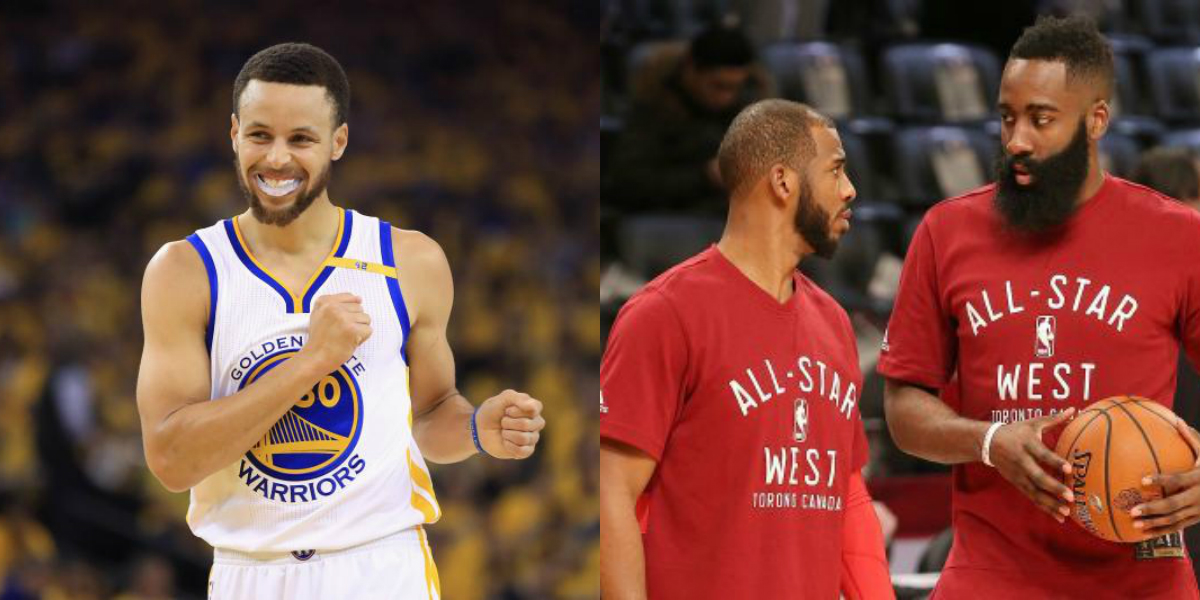
Left: Ezra Shaw/Getty Images; Right: Joe Murphy/Getty Images
Deciding between Harden-Paul or Curry-Thompson is tricky and just depends on what you consider more valuable. Curry provides something for his team that is unmatched by anyone. Paul is probably the most complete player of the four. Thompson plays off of Curry and his other teammates, while Harden leads the league in usage.
But only one of those duos has tasted victory in the playoffs. Harden and Paul are looking to help each other snap the tiring postseason narratives. They are both trying to get D’Antoni over the hump after so many of his electric seasons in Phoenix ended in disappointment (mostly by Gregg Popovich and the Spurs).
The Rockets’ road to the Western Conference Finals must go through the Minnesota Timberwolves, then either the Oklahoma City Thunder or Utah Jazz. All three teams finished with at least 47 wins, making no path easy in this brutal conference.
With the matchup versus Minnesota in the first round, it’s tough to know whether or not Houston should be excited.
First Round Match-up
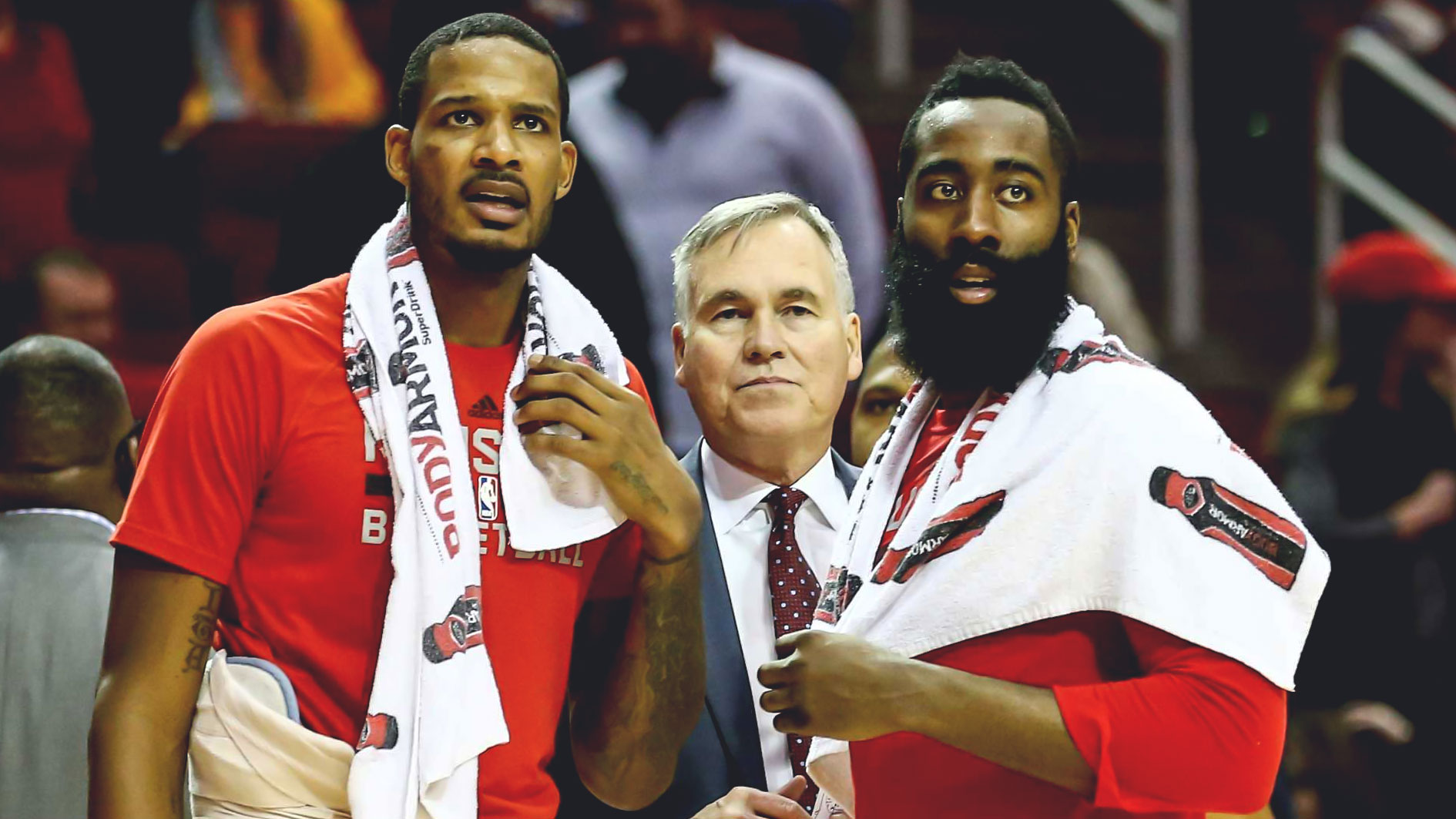
On one hand, they completely blitzed the Timberwolves in all four meetings this season. The Rockets went 4-0, scoring 129.8 points per 100 possessions, with a 64.4 true shooting percentage. It was the most Minnesota allowed against any opponent, in both categories. No game was within nine points. With Paul on the court in all four games, Houston had a net rating of plus-22.6. They kept the pace slow (93.4 in Paul’s minutes), while he surgically picked apart the Wolves’ defense.
Keep in mind, this is no small sample size. It’s almost 200 minutes of play, with Jimmy Butler playing 42 minutes in the first game, 36 in the second, and 25 in the third before tearing his meniscus. Karl-Anthony Towns played in all four, and so did Andrew Wiggins.
The Rockets’ shot chart in all four games combined is frightening. They basically got everything they wanted from the corners and beyond the arc, while torching Minnesota all around the paint, too:
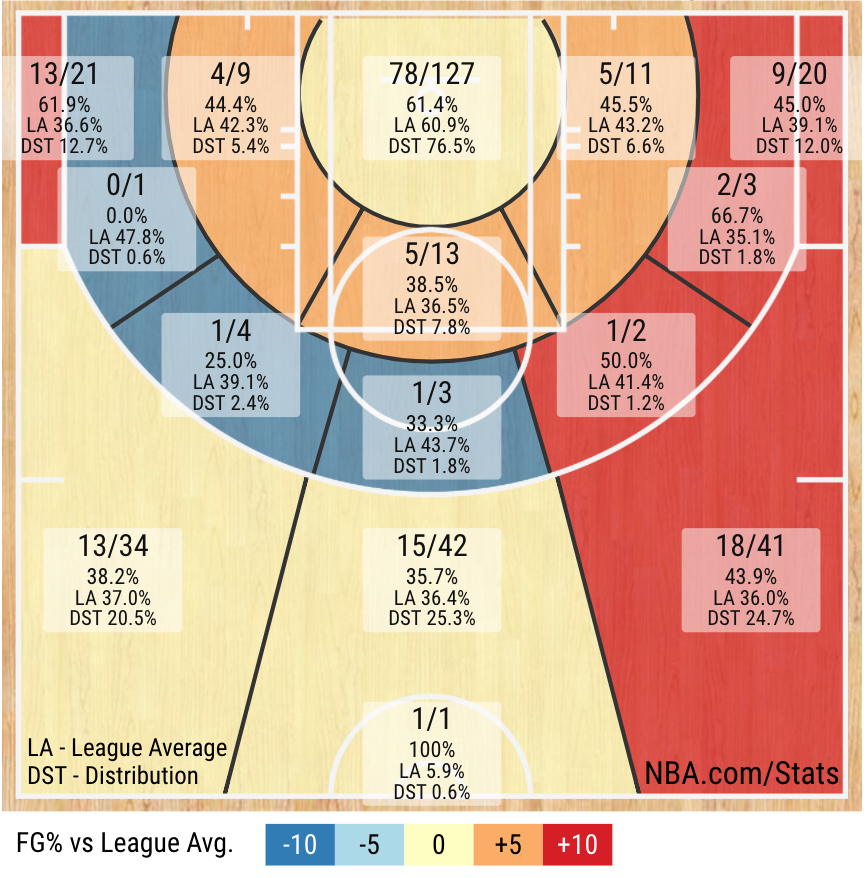
On the other hand, Minnesota is fired up after breaking the 14-year drought of not making the playoffs. Butler hasn’t looked too rusty in his three games back from injury, shooting 51.3 percent from the field and attacking the basket at will. He had 32 free throw attempts in those three games, getting to the line for easier points than he did earlier this season.
The Wolves’ starters are just not the team you would prefer facing in a seven-game series, particularly when they’re coached by Tom Thibodeau, who is a master of preparation. With multiple days between games in the playoffs, teams are able to make a lot more adjustments and study tendencies compared to the nonstop regular season schedule.
Even with Houston taking the season sweep this year, it’s wild that a reward for a 65-win, top-seeded team is a matchup with the fourth-most efficient offense in the league. Minnesota might have its issues, but when you’re scoring at a better rate than the 2015 Warriors (first title season), it allows for great variance in the playoffs.
A Battle of Attrition
This series should be named the “eight-man rotation.” Hell, maybe even seven. Because that’s all it will be for Thibodeau and D’Antoni, who have never dug deep into their benches during the playoffs. In Thibodeau’s case, he can’t afford to at this point. For as much criticism as he gets for riding his starters so many minutes, the Wolves have no reliable bench to trust during a regular season, and that will only be amplified now, during the games that matter.
The starting five of Teague-Butler-Wiggins-Gibson-Towns has played 1,131 minutes this season, the most in the league. When you consider that Butler missed 23 games, it sounds unbelievably ridiculous. But at the same time, the starters have performed well, posting a respectable 104.5 defensive rating in those minutes, and leading by comfortable margins before the bench pieces are inserted.
That’s what makes this series so much fun, even if it’s the Rockets pulling away at the end of games and taking a gentlemen’s sweep. The floor will be loaded with star power, and four of the top 15-20 players in the league will be on display.
Houston has no reason to respect the Wolves’ defense, however, and that’s the biggest factor here. It would be different if Harden had nobody behind him to run the offense when he rests, but that’s not the case anymore. Paul carved up Minnesota this year, with his own scoring just as much as distributing.
Paul shot 14-of-21 (66.7 percent) from inside the arc against the Wolves, utilizing the high screen-and-roll with Nene and Clint Capela to find open space in the defense. He doesn’t find Jeff Teague as a defensive threat against him, nor should he. When Paul is operating without Harden on the floor, that’s when he’s able to activate scoring mode and create his favorite looks:
Also, it’s worth noting the very last clip in the sequence above. In this matchup, Teague and others have routinely been out of proper position defensively, and the Rockets’ absurd spacing tactics have caused so much confusion. Driving lanes have been as clear as an airport runway, and the Rockets are patient this year in working the ball around to get better shots.
They have a variety of ways of getting downhill against Towns and Gibson, such as this set where they bring the four and five (Tucker and Capela) up top for double-screen action. Minnesota’s bigs come up high, Paul is able to dictate whether he uses the screens to go left or right, and Capela does a fantastic job at rim-running to beat Towns to the spot:
As shaky as Towns’ defense can be, it’ll be extremely difficult for Thibodeau’s bench to hold up without getting scorched (even more) when he rests. They haven’t been able to limit Houston’s high Spain pick-and-roll, particularly when it’s Gorgui Dieng being attacked.
The spacing is just borderline unreal, making it easy as cake for Capela or Nene to have a clear path when the backscreener’s man (Butler here) has to watch out for the three-point threat:
There’s no great answer to stop any of this, unless you leave the corner shooters. Even then, that’s why they have groomed their roll men (specifically Capela) into making the proper reads once he’s hounded.
Speaking of corner shooters, it’s probably the main reason the Rockets are beyond deadly in transition. The fundamental concept of everyone hauling it to specific spots on the fastbreak is enough to create chaos. Defenders aren’t prepared for all of the weapons whenever Houston fills the corners first. You have to pick your poison:
Houston scored 1.20 points per transition possession this season, and it was because of this technique. Making defenders choose what to commit to — when the two options are literally 20 feet apart — is just how you run an intelligent up-tempo offense.
Defensively, the Wolves allowed teams to shoot an effective field goal percentage of 61.7 in transition, the fourth-worst in the league. It was only better than the Kings, Bulls, and Nuggets, and worse than the Cavaliers. That’s … not the best combo in the world. It’s the most efficient full-court offense in the world against one of the worst at stopping it. Towns has to do a much better job at getting back in a hurry. Almost every trip down, Capela is simply racing past him, filling the lane, and forcing other defenders to cut him off.
While the Rockets usually get criticized for not moving or passing enough, they’ve had really strong moments against Minnesota. Once they run initial pick-and-roll action, weak side cutters have done an excellent job of moving to the ball, forcing nearly every defender to rotate. They absolutely had the Wolves on a string for many possessions:
When they aren’t isolating at the top of key, Houston can initiate some creative, unguardable stuff. And it all starts with how perfectly they space you out.
Take this for example. Harden starts a possession in the restricted area, guarded by Butler. Ryan Anderson hits Butler with a quick first screen, as Harden curls up toward the ball. Nene completes a dribble hand-off, then tries to hit Butler with the second (double-staggered) screen. As Nene times his roll to the rim, Gibson has to slide over and tag him to prevent a layup.
Look who it leaves open in the corner, because Butler had to chase Harden:
Here’s a similar situation, on basic pick-and-roll between Harden and Capela. Butler is aware that his teammate (Towns) has to step in front of Harden on the drive, so he wants to help by cutting off the roll man. Well, if you do, Houston just makes you pay:
More than anything, what Houston and Golden State do better than anyone in the league is simple. They make you decide what you’re going to give up. Because you have to give up something when you’re defending both of them. It just so happens that Golden State has deadlier (or more reliable) options beyond their top two stars, which makes them the favorite, to me.
Houston will cruise to a first round victory in five games. Minnesota is on the verge of breaking through, and its 16-game improvement from last season is definitely impressive. This is just the wrong opponent for them — one that will exploit their two weaknesses of having too many negative defenders and a lack of strong second unit.
This is the best overall team the Rockets have ever produced, which would feel crazy to some, because Hakeem Olajuwon won two championships during the mid-1990s. The addition of Paul gives Harden adequate minutes to rest, a clearer direction and game plan in fourth quarters, and experience to lean on when he gets cold. That does happen, just watch last year’s West semifinals.
Paul benefits from not having to pound the ball for so many possessions each game, feeling comfortable enough to trust this offense with creating a great shot. Right or wrong, he didn’t trust Blake Griffin’s playmaking as much as most would’ve preferred. Now, he can play in the background and not miss a beat.
They may not win the title. If they didn’t co-exist with an abnormal roster and greatest shooting core ever, they would be virtual locks. But Paul and Harden have given each other a better chance than ever before, and their careers will only benefit in the coming years.
The post The greatest backcourt in NBA history seeks to shed its own past appeared first on ClutchPoints.






